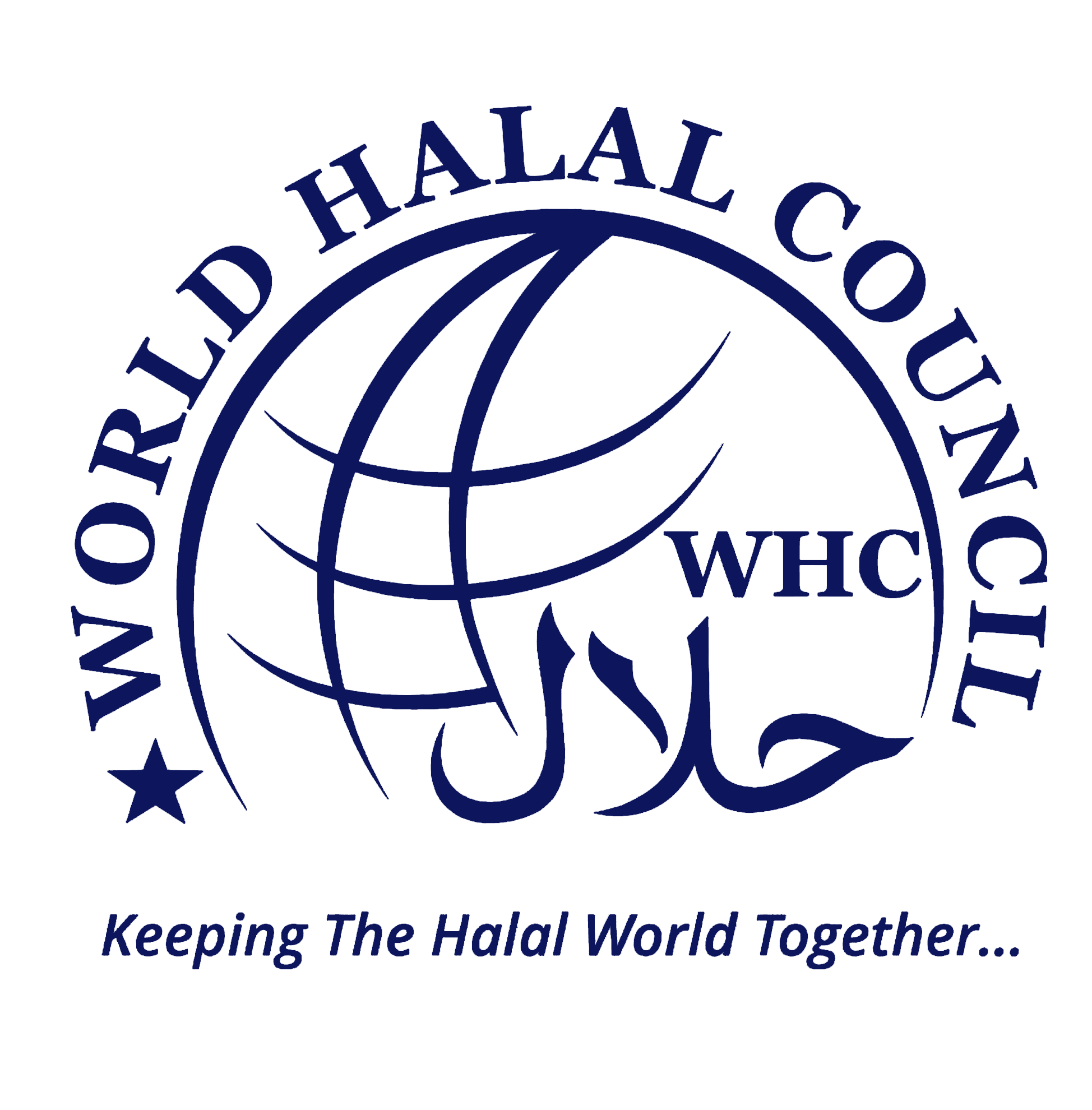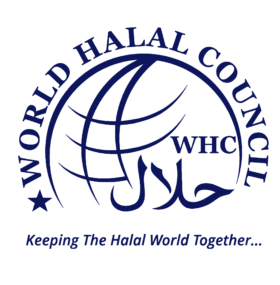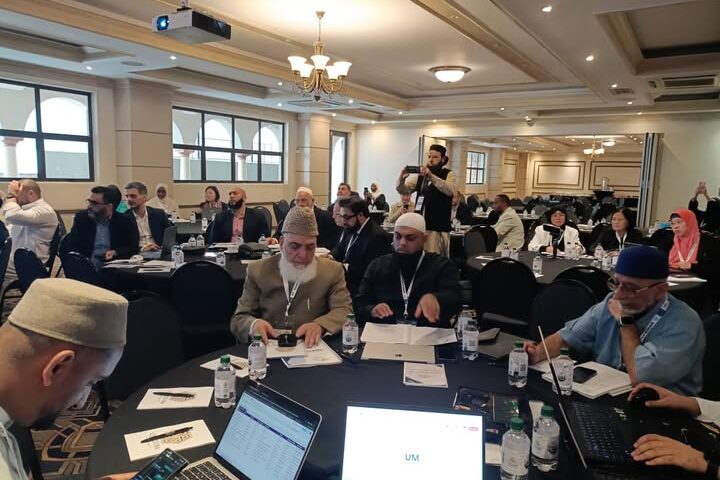The 21st Annual General Assembly of the World Halal Council (WHC) will take place from November 12-14, 2025, at Qurtuba Hospitality in the Sandton district of Johannesburg, South Africa.
During the opening remarks, a letter from WHC Patron Dr. Hüseyin Kami BÜYÜKÖZER was read. Today and tomorrow’s program is proceeding as normal, focusing on opening ceremonies, reading reports, and discussing past work. We will hopefully provide more detailed information when the WHC programs conclude on Friday.
Dr. Hüseyin Kami BÜYÜKÖZER’s letter:
My dear brothers and sisters with whom I have shared a heartfelt connection under the WHC umbrella,
We have gathered in Johannesburg for the 21st Congress of the WHC, hosted by SANHA, which will mark the 26th anniversary of its founding this year.
I greet you all with my warmest regards, and wish you all the best in halal and I extend my gratitude for your invaluable contributions to the cause of the Almighty. I hope this year’s 21st General Assembly Meeting will be a blessing for both our community and the entire Ummah. I express my gratitude to our brothers who have served us to this day and pray to Allah (SWT) for mercy upon those who have passed away.
Let us come together to celebrate 26 years of halal excellence and ensure that the next 27th year will be even more impactful. As the Prophet Muhammad (peace be upon him) said, “The best people are those who are most beneficial to others.”
This gathering marks a significant moment for both the local Halal industry and the global Halal ecosystem. However, for many outside the certification community, the question arises: What exactly does the WHC do, and why is this event such a significant event?
The Role and Impact of the World Halal Council: Since its founding in 1999, the WHC has been at the forefront of promoting collaboration and unity among Halal Certification organizations worldwide. As Muslims represent approximately one-third of the global population, representing over 2 billion people in 195 countries, the demand for Halal products has rapidly increased with globalization, technological advancements, and the preservation and spread of Islamic values. The WHC was established to ensure universal recognition and harmonization of Halal food standards and to protect the religious and ethical principles of Muslim consumers.
However, the landscape of Halal certification is far from simple. Differences in interpretation on fundamental issues such as stunning, mechanical slaughter, the use of certain additives, artificial meat, and the use of insects have made it necessary for Halal certification bodies to work together. This collaboration ensures that Halal certification not only upholds religious principles but also maintains the trust of consumers worldwide.
The Journey to the Creation of the WHC: The WHC’s origins date back to the 1990s. This was a period of significant change in the world: the end of the Cold War, the emergence of the internet revolution, and a renewed global appreciation for Islamic values. These global shifts led to the recognition that Muslim consumers needed a unified Halal standard they could trust, regardless of their geographic location.
Following years of discussion and collaboration among Halal certifiers worldwide, the WHC was officially established in Jakarta in 1999 and later registered as an international organization in Manila, Philippines. Today, the WHC’s Secretariat is located in Malaysia, with the permanent chairmanship in Türkiye (GIMDES), and serves as the central point of oversight for a diverse network of Halal certifiers in numerous countries. Through their tireless efforts, they strive to ensure that the Halal products trusted by consumers meet the rigorous and universally accepted standards.
However, the landscape of Halal certification is far from simple. Differences in interpretation on fundamental issues such as stunning, mechanical slaughter, the use of certain additives, artificial meat, and the use of insects have made it essential for Halal certification bodies to work together. This collaboration ensures that Halal certification not only upholds religious principles but also maintains the trust of consumers worldwide.
The Journey to the Creation of the WHC: The WHC’s origins date back to the 1990s. This was a time when the world changed significantly: the end of the Cold War, the birth of the internet revolution, and a renewed global appreciation for Islamic values. These global shifts led to the recognition that Muslim consumers needed a unified Halal standard they could trust, regardless of their geographic location.
After years of discussion and collaboration among Halal certifiers worldwide, the WHC was officially established in Jakarta in 1999 and later registered as an international organization in Manila, Philippines. Today, the WHC’s Secretariat is located in Malaysia, and the permanent chairmanship is in Turkey (GIMDES), serving as the central point overseeing the diverse network of Halal certifiers in many countries. Through their tireless efforts, they strive to ensure that Halal products, trusted by consumers, meet strict and universally accepted standards.
At this point, I would like to address a crucial issue today. We all know that Halal food and products must be brought together under a single roof and under a common standard worldwide. At GIMDES, we act with our motto, “One Voice, One Heart.” As advocates of Halal and Tayyib principles, we believe that Muslims must move forward with the same determination on this issue. We must continue to work with this awareness to preserve and strengthen our unity and protect our shared values.
Furthermore, we must be vigilant about not consuming products that are under the control of evil forces and that do not align with our Islamic values. Not purchasing these boycotted products is an important step towards not supporting economies that serve haram and oppression. Acting with this awareness, as required by our Muslim identity, is our individual and societal responsibility.
I would like to emphasize the importance of the Dar al-Halal Madrasah, one of the important projects we carry out within GIMDES. With this educational project, we provide our Muslim brothers and sisters with access to technical and fiqh knowledge in the light of Islamic sciences. This program, enriched by the contributions of our international guest lecturers, aims to raise more well-equipped generations in the fields of halal and tayyib. We urge you, our valued brothers and sisters, to implement such projects in your own countries. Such efforts will contribute to the strengthening and awareness of our Ummah in every respect.
Finally, I would like to highlight the importance of the Qard al-Hasan system. Based on the principle of interest-free lending, Qard al-Hasan is a significant system that strengthens solidarity and mutual aid in society. This principle is one of the cornerstones of our economic solidarity and one of the most effective ways of financial assistance among Muslims. It should be our duty to all to promote Qard al-Hasan for a halal and righteous economy.
I wish you success in our endeavors, permanence in our unity, and beneficial results for our Ummah. May Allah always guide us on the right path, within the realm of halal and righteousness.
As a reminder, I present a snapshot from our 2018 meeting in Istanbul.
The World Halal Council’s 10th International Halal and Righteous Products Conference, organized by the World Halal Council (WHC) and hosted by the Food and Necessities Inspection and Certification Research Association (GIMDES) and the World Halal Foundation, was held in Istanbul.
The challenges faced by halal certification organizations and the importance of the education system in human resources development were discussed in the third and fourth sessions, where speakers included Prof. Dr. Sukoso, Salih Yüksel, Habib Ghanim, Zafer Gedikli, Dr. Kami Büyüközer, Dr. Adel Sabır, Dr. Hamit Akçay, and Thafier Naccar.
“All products, goods, and services must be halal certified.” Prof. Dr. Sukoso explained that halal certification was implemented with the enactment of Law No. 33/2014 on Halal Product Guarantee, based on the powers stipulated in the 1945 Constitution of the Republic of Indonesia. He stated, “According to this article of the Constitution, everyone has the freedom to worship according to their religion and belief. Based on this fact, the state has taken control of the situation in which products used and consumed by the Indonesian people carry the ‘Halal’ guarantee. All products, goods, and services entering and trading in Indonesian territory must be halal certified.”
“Science can determine that this method causes less harm to animals.” Habib Ghanim stated that Muslims should not be afraid to state that Islam is not opposed to science, saying, “What is our relationship with science as Muslims? For example, what is our approach to electronarcosis in slaughtering activities? What is the purpose of defining whether electronarcosis is a good or bad thing? Science can determine that this method causes less harm to animals.”
“We consider it our duty to raise a conscious generation educated in Islamic principles.” Dr. Büyüközer, who declared that GIMDES and the World Halal Foundation consider it their duty to raise a conscious generation educated in Islamic principles, said, “We believe that the ‘Dar al-Halal Madrasah’ Project will protect our future generations from great dangers, to meet human needs with an awareness of Islamic principles, to provide international-quality education and career opportunities by providing world-class education with global accreditation. We aim to contribute to raising public awareness.”
Reminding us of the Quran al-Kareem, Mr. Thafier Najjar stated that Allah loves the believer who is skilled in his work, saying, “Surely, we never waste the deeds of those who do good deeds. If we look at the verse above, we understand that Islam demands that we do our best. Here, we are trying to increase our knowledge and commitment.”
“Quality can be easily integrated with System Management” Dr. Muhamad Nadratuzzaman stated that the Quality Management System regulates the safety of products based on their content, critical points, and processing stages. He touched on the following points: “The Halal Assurance System Consultant must ensure that components with appropriate halal certification are used. The critical point in the quality system, which is not very different from the Halal Assurance System regulations, is to ensure that there is no cross-contamination with non-halal products during processing, storage, and distribution. Furthermore, the steps of the Halal Assurance System can be easily integrated with Quality System Management, which is based on 11 principles.”
“We live in a fast-paced, high-tech world. Halal certification bodies must keep pace with the rapidly advancing high-tech world.”
Mr. Moulana Said Navlakhi, noting that we live in a fast-paced, high-tech world with evolving innovations across various areas of socioeconomic and political life, said, “There is tremendous access to information and a growing demand for transparency, accountability, and excellence in service delivery.”
Dr. Hüseyin Kâmi BÜYÜKÖZER
President of GIMDES and WHC Patron




